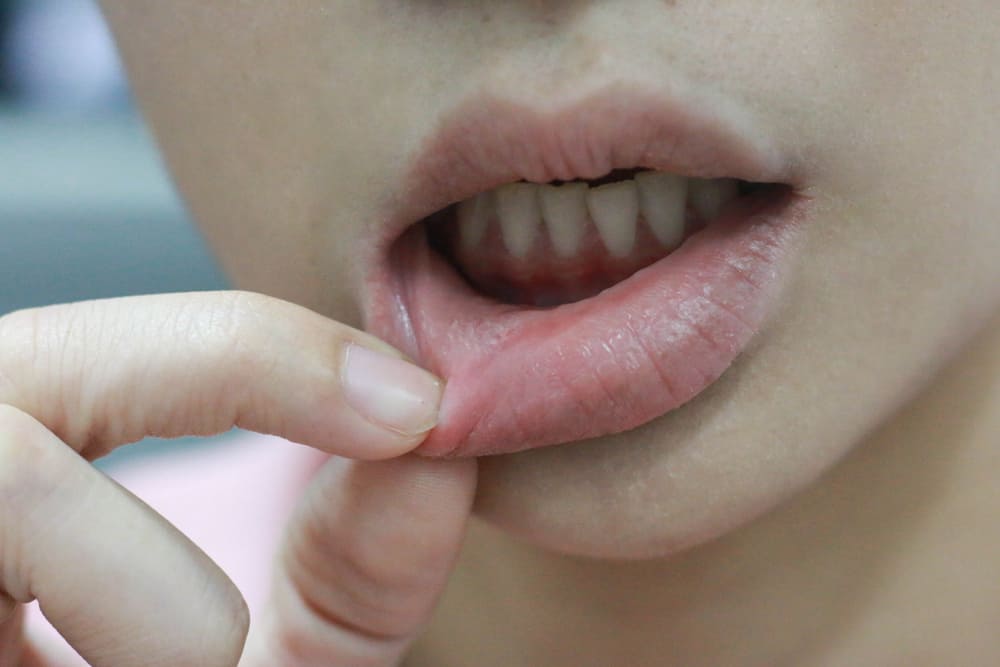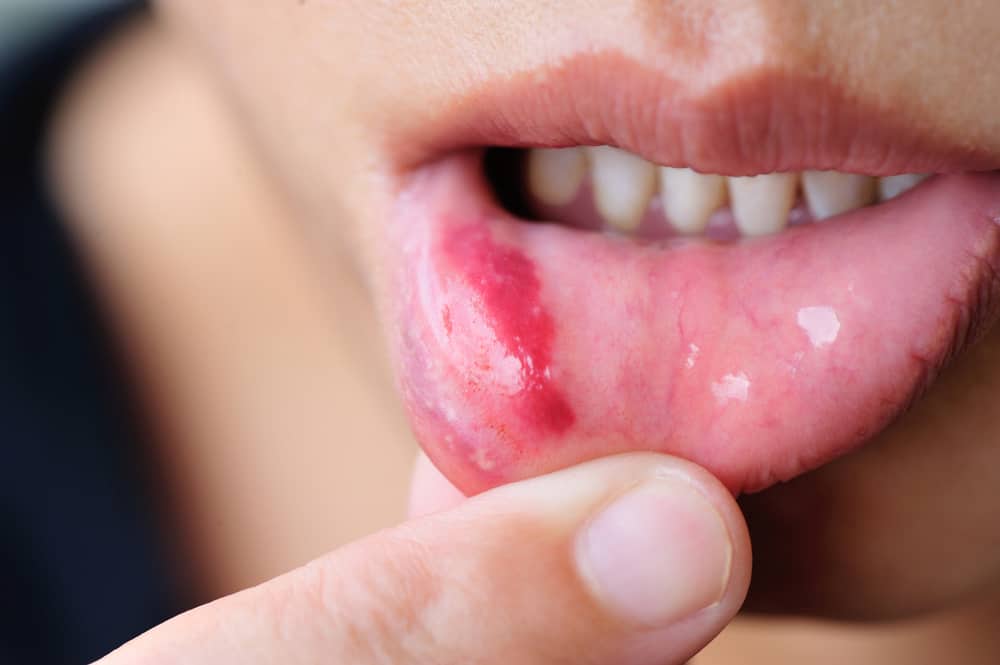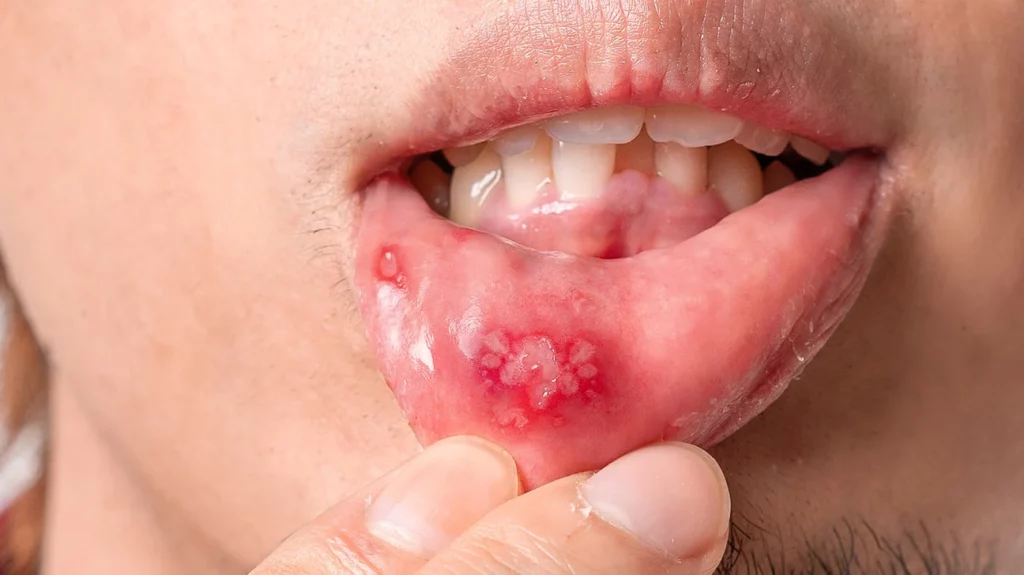Canker sores are small, painful ulcers that can develop inside the mouth, on the lips, or on the tongue. They are a common oral health concern, affecting up to 20% of the population. While canker sores are generally harmless and go away on their own within a week or two, they can be especially troublesome for pregnant women.
Pregnancy is a time when women experience a wide range of physical changes, including hormonal shifts and changes in the immune system. These changes can make women more susceptible to developing canker sores.
In addition, stress, poor nutrition, and lack of sleep, which are common during pregnancy, can also increase the risk of developing canker sores.
Key Takeaways
- Canker sores are a common oral health concern that can be especially troublesome for pregnant women.
- Pregnancy-related changes in the body can increase the risk of developing canker sores.
- Stress, poor nutrition, and lack of sleep can also contribute to the development of canker sores during pregnancy.
Understanding Canker Sores

Canker sores, also known as aphthous ulcers, are shallow ulcers that appear on the inside of the mouth, lips, cheeks, and tongue. These sores are common and can be quite painful, especially during pregnancy.
The exact cause of canker sores is unknown, but they are believed to be caused by a combination of factors, including stress, trauma, bacteria, and inflammation. Some people may also have a genetic predisposition to developing canker sores.
Canker sores are not contagious, and they are not caused by a virus. They are typically small, round, or oval-shaped and have a white or yellow center with a red border. Most canker sores heal on their own within one to two weeks, but larger sores may take longer to heal.
During pregnancy, canker sores may be more common due to hormonal changes and increased stress levels. It is important to maintain good oral hygiene and avoid foods that may irritate the mouth, such as spicy or acidic foods.
If you have a canker sore during pregnancy, it is important to talk to your healthcare provider about treatment options. Over-the-counter pain relievers, such as acetaminophen, may help relieve pain.
Additionally, topical treatments, such as benzocaine or lidocaine, may help numb the area and provide relief.
In some cases, canker sores may be a sign of an underlying medical condition, such as celiac disease or inflammatory bowel disease. If you have frequent or severe canker sores, it is important to talk to your healthcare provider to determine the underlying cause and appropriate treatment.
Overall, canker sores are a common and usually harmless condition. However, they can be painful and uncomfortable, especially during pregnancy. By understanding the causes and treatment options for canker sores, you can better manage this condition and reduce your discomfort.
Canker Sores During Pregnancy

Canker sores, also known as aphthous ulcers, are small, painful lesions that can develop on the inside of the mouth or on the lips. Many women experience canker sores during pregnancy, particularly during the first trimester.
Hormonal changes during pregnancy can cause an increase in the production of progesterone and estrogen, which can lead to the development of canker sores. These sores can also be a symptom of pregnancy, along with morning sickness, fatigue, and other common symptoms.
While canker sores are generally harmless and will go away on their own within a week or two, they can be uncomfortable and make it difficult to eat or speak. Pregnant women who experience canker sores should avoid spicy or acidic foods and use a soft-bristled toothbrush to avoid irritating the sore.
If a canker sore is particularly painful or does not heal on its own, a doctor may recommend a topical medication to help alleviate the discomfort. Pregnant women should always consult with their healthcare provider before taking any medication during pregnancy.
In summary, canker sores are a common symptom of pregnancy, particularly during the first trimester. Hormonal changes during pregnancy can cause an increase in the production of progesterone and estrogen, which can lead to the development of canker sores.
While generally harmless, pregnant women who experience canker sores should take steps to alleviate discomfort and consult with their healthcare provider if necessary.
Potential Causes of Canker Sores in Pregnancy
Canker sores are small, painful ulcers that can form inside the mouth, on the tongue, or on the lips. They are common during pregnancy and can be caused by a variety of factors.
1. Nutritional Deficiencies
Nutritional deficiencies, particularly of iron and folic acid, can contribute to the development of canker sores. Pregnant women are at an increased risk of developing these deficiencies, as the body requires more nutrients to support the growing fetus.
Iron and folic acid supplements may be recommended to prevent canker sores and support overall health during pregnancy.
2. Stress
Stress is a common trigger for canker sores, and pregnancy can be a stressful time for many women. Hormonal changes, physical discomfort, and concerns about the baby’s health can all contribute to stress levels.
Finding ways to manage stress, such as practicing relaxation techniques or seeking support from loved ones, may help prevent canker sores.
3. Food Sensitivities
Some women may develop canker sores in response to certain foods. Acidic or spicy foods, such as citrus fruits or hot peppers, can irritate the mouth and trigger the development of canker sores. Additionally, some women may have food sensitivities that contribute to canker sore development.
Keeping a food diary and avoiding trigger foods may help prevent canker sores.
4. Trauma
Trauma to the mouth, such as biting the tongue or cheek, can also contribute to the development of canker sores. Pregnant women may be more prone to mouth injuries due to changes in the body’s balance and coordination.
Taking care when eating and speaking, and avoiding hard or sharp foods, may help prevent mouth injuries and subsequent canker sores.
5. Acid Reflux
Acid reflux, or gastroesophageal reflux disease (GERD), can cause stomach acid to flow back up into the esophagus and mouth. This can irritate the mouth and trigger the development of canker sores. Pregnant women may be at an increased risk of developing acid reflux due to hormonal changes and increased pressure on the stomach.
Managing acid reflux through diet and lifestyle changes may help prevent canker sores.
Symptoms of Canker Sores

Canker sores are small, painful, round or oval-shaped ulcers that can appear anywhere inside the mouth, including the gums, tongue, lips, and inner cheeks. They are usually white or yellow in colour and have a red border.
Canker sores can cause a burning sensation, numbness, and swelling in the affected area.
In some cases, canker sores can be large and persistent, making it difficult to eat, drink, and speak. They can also be accompanied by a high fever, indicating that the body is fighting an infection.
The exact cause of canker sores is not known, but they are thought to be triggered by a variety of factors, including stress, hormonal changes, food allergies, and certain medical conditions. Pregnant women are particularly susceptible to canker sores due to the hormonal changes that occur during pregnancy.
If you experience any of the symptoms of canker sores during pregnancy, it is important to seek medical attention to rule out any underlying medical conditions and to receive appropriate treatment. Treatment options may include topical medications, oral medications, and lifestyle changes such as stress reduction and dietary modifications.
Role of Oral Health in Preventing Canker Sores

Maintaining good oral health is crucial in preventing canker sores during pregnancy. Canker sores are small, painful ulcers that develop inside the mouth and can be triggered by various factors, including stress, hormonal changes, and poor oral hygiene.
Regular brushing and flossing can help prevent plaque buildup, which can irritate the mouth and lead to canker sores. Using a soft-bristled toothbrush and fluoride toothpaste can also help keep the mouth clean and healthy.
In addition to brushing and flossing, it is important to maintain a healthy diet and avoid foods that can trigger canker sores, such as acidic or spicy foods. Drinking plenty of water can also help keep the mouth hydrated and prevent dryness, which can contribute to the development of canker sores.
During pregnancy, it is especially important to maintain good oral health as hormonal changes can increase the risk of developing canker sores. Pregnant women should continue to brush and floss regularly and schedule regular dental check-ups to ensure their oral health is in good condition.
In summary, maintaining good oral hygiene and a healthy diet can help prevent canker sores during pregnancy. Regular brushing and flossing, using fluoride toothpaste, and avoiding trigger foods can all contribute to a healthy and pain-free mouth.
Nutrition and Canker Sores
A well-balanced diet is essential during pregnancy to ensure the health of both the mother and the developing baby. Adequate nutrition can also help prevent or alleviate canker sores, which are common during pregnancy.
Zinc is a mineral that plays a crucial role in the immune system and wound healing. It has been found that zinc deficiency can lead to recurrent canker sores. Therefore, it is important to consume foods rich in zinc, such as oysters, beef, chicken, beans, nuts, and whole grains.
Vitamin D is also important for the immune system and can help reduce inflammation. It can be obtained from sunlight exposure or from foods such as fatty fish, egg yolks, and fortified dairy products. Supplements may also be recommended if a deficiency is detected.
Folate and vitamin B12 are essential for the formation of red blood cells and the development of the nervous system. Low levels of these nutrients can cause mouth sores. Good sources of folate include leafy greens, beans, and citrus fruits. Vitamin B12 is found in animal products such as meat, fish, and dairy.
Eating a variety of fruits and vegetables can provide a range of vitamins and minerals that are important for overall health, including calcium, which is needed for strong bones and teeth. Nutrient-dense foods such as lean protein, whole grains, and healthy fats should also be included in the diet.
Prenatal vitamins are specifically designed to meet the increased nutritional needs of pregnant women. They often contain higher levels of nutrients such as folate, iron, and calcium. However, it is important to consult with a healthcare provider before taking any supplements.
In conclusion, a balanced and varied diet is key to preventing and managing canker sores during pregnancy. Adequate intake of zinc, vitamin D, folate, and vitamin B12, as well as a variety of fruits, vegetables, and nutrient-dense foods, can help support the immune system and reduce inflammation.
Management and Treatment of Canker Sores
Canker sores are a common condition that can occur during pregnancy. Although they are not harmful, they can be painful and uncomfortable. There are several ways to manage and treat canker sores during pregnancy.
1. Rest and Good Oral Hygiene
One of the first things that a pregnant woman can do to manage canker sores is to rest and maintain good oral hygiene. This includes brushing and flossing regularly and avoiding foods that may irritate the sores.
Additionally, a pregnant woman should avoid smoking and excessive alcohol consumption, as these can make the sores worse.
2. Medications and Gels
If the canker sores are particularly painful, a pregnant woman may benefit from using a topical gel or over-the-counter medication. There are several gels and medications available that are safe to use during pregnancy, but it is important to consult with a doctor before using any new medication.
3. Ice Cubes
Another way to manage canker sores is to apply ice cubes directly to the sores. This can help to numb the area and reduce pain and swelling. However, it is important to wrap the ice cubes in a towel or cloth before applying them to the sores to avoid damaging the surrounding tissue.
4. Herpes and Canker Sores
It is important to note that canker sores are not the same as herpes sores. Herpes sores are caused by the herpes virus, while canker sores are not contagious. If a pregnant woman is experiencing sores that are similar to canker sores but are accompanied by other symptoms, such as fever or swollen glands, she should consult with a doctor to rule out herpes.
In conclusion, canker sores can be managed and treated safely during pregnancy. Rest, good oral hygiene, and the use of gels and medications can help to alleviate pain and discomfort. It is important to consult with a doctor before using any new medication, and to differentiate canker sores from herpes sores if necessary.
Other Oral Health Concerns During Pregnancy

Pregnancy can cause a variety of oral health concerns in addition to canker sores. These include gingivitis, morning sickness, bleeding gums, mouth sores, lumps, and cold sores.
Gingivitis is a common oral health concern during pregnancy. It is caused by hormonal changes and can lead to inflammation and bleeding of the gums. Pregnant women should practice good oral hygiene, including brushing twice a day, flossing daily, and using an antiseptic mouthwash to prevent gingivitis.
Morning sickness can also affect oral health during pregnancy. Vomiting can expose teeth to stomach acid, which can erode tooth enamel. Pregnant women should rinse their mouth with water or a fluoride mouthwash after vomiting to help neutralize the acid.
Bleeding gums are another common oral health concern during pregnancy. Hormonal changes can cause gums to become more sensitive and prone to bleeding. Pregnant women should continue to brush and floss regularly, but should be gentle to avoid further irritation.
Mouth sores and lumps can also occur during pregnancy. If a pregnant woman notices any unusual growths or sores in her mouth, she should consult her dentist or healthcare provider to rule out any serious conditions.
Cold sores can be a concern for pregnant women who have a history of herpes simplex virus. Cold sores can be transmitted to the baby during delivery, which can be dangerous. Pregnant women who have a history of cold sores should discuss prevention and treatment options with their healthcare provider.
Overall, pregnant women should prioritize good oral hygiene and consult their healthcare provider or dentist if they notice any unusual oral health symptoms.
Lifestyle Changes for Prevention
Pregnancy canker sores can be painful and uncomfortable, but there are a few lifestyle changes that can help prevent them from occurring.
1. Stress Management
Stress is a common trigger for canker sores, so it is important to manage stress levels during pregnancy. This can be achieved through relaxation techniques such as meditation, yoga, or deep breathing exercises.
It is also important to get enough rest and sleep to avoid stress-related canker sores.
2. Food Sensitivity
Some people are sensitive to certain foods, and this can trigger canker sores. During pregnancy, it is important to avoid foods that may cause sensitivity such as acidic or spicy foods.
It is also important to maintain a healthy and balanced diet that includes plenty of fruits and vegetables.
3. Daily Exercise
Regular exercise can help reduce stress levels and improve overall health, which can help prevent canker sores during pregnancy. It is important to engage in low-impact exercises that are safe for pregnant women, such as walking, swimming, or prenatal yoga.
4. Injury Prevention
Injuries to the mouth can also trigger canker sores. To prevent this, pregnant women should avoid chewing gum, hard candies, and other foods that may cause injury to the mouth. It is also important to practice good oral hygiene, including brushing and flossing regularly.
Overall, making these lifestyle changes can help prevent canker sores during pregnancy. If canker sores do occur, it is important to seek medical advice from a healthcare professional.
Frequently Asked Questions
Are mouth sores common during pregnancy?
Yes, mouth sores are common during pregnancy. Hormonal changes during pregnancy can cause changes in the body that can lead to the development of canker sores.
What causes canker sores in the mouth?
The exact cause of canker sores is not known, but they are believed to be caused by a combination of factors, including stress, hormonal changes, and certain foods.
How can I treat canker sores while pregnant?
There are several treatments available for canker sores, including over-the-counter medications, prescription medications, and home remedies. However, it is important to speak with a healthcare provider before using any medications during pregnancy.
What are some home remedies for mouth ulcers in pregnancy?
Some home remedies for mouth ulcers during pregnancy include rinsing the mouth with salt water, applying a baking soda paste to the affected area, and using aloe vera gel.
Can tongue sores be an early sign of pregnancy?
Tongue sores are not typically an early sign of pregnancy. However, hormonal changes during pregnancy can cause changes in the body that can lead to the development of canker sores.
Are mouth ulcers a symptom of pregnancy?
Mouth ulcers are not a common symptom of pregnancy, but they can occur due to hormonal changes during pregnancy. It is important to speak with a healthcare provider if you experience any unusual symptoms during pregnancy.

Iesha is a loving mother of 2 beautiful children. She’s an active parent who enjoys indoor and outdoor adventures with her family. Her mission is to share practical and realistic parenting advice to help the parenting community becoming stronger.
